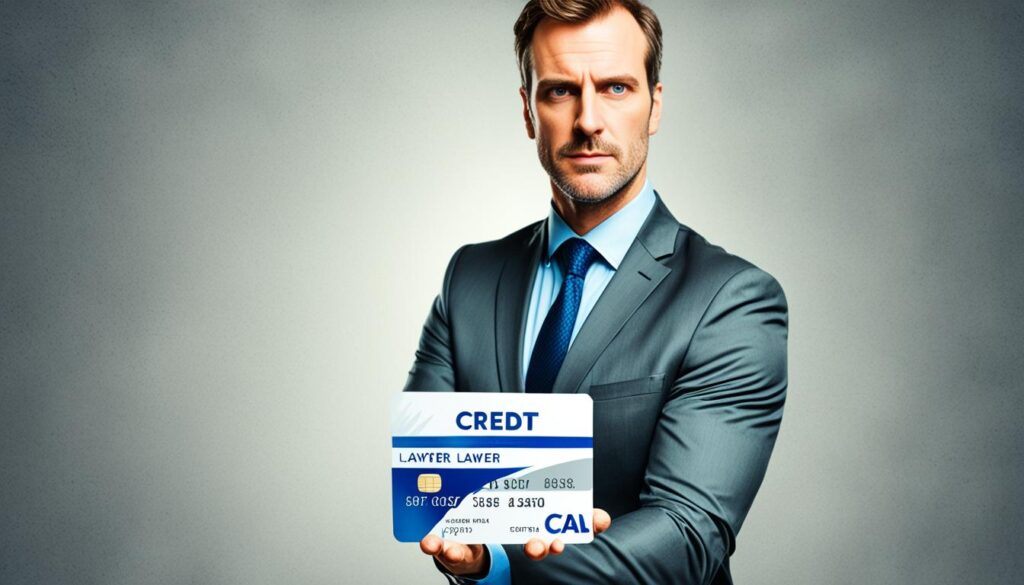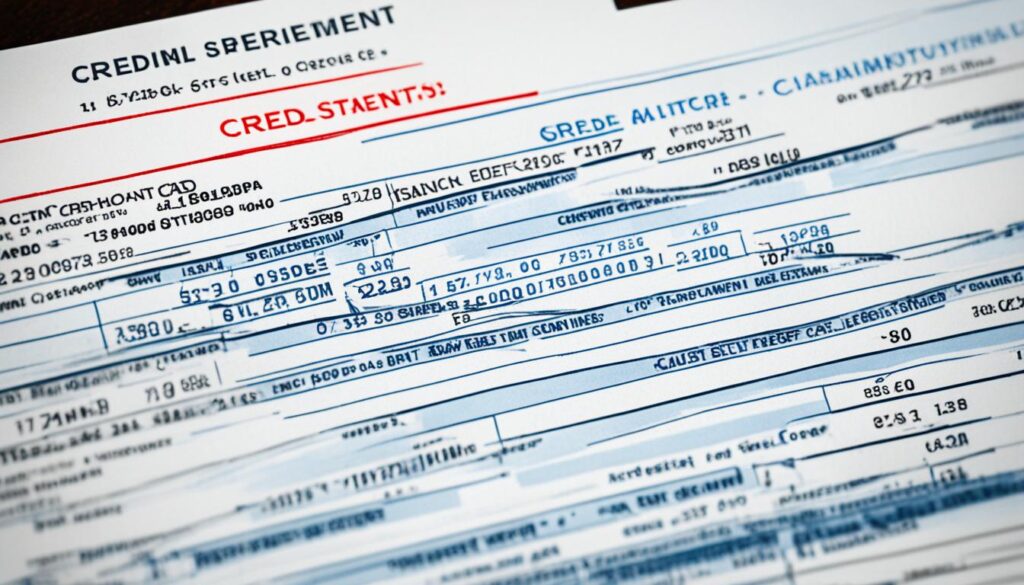Credit card billing errors can be frustrating. Sometimes, you might need legal help to protect your rights. The Fair Credit Billing Act offers protection, but it can be complex.
A lawyer specializing in credit card disputes can be invaluable. They can guide you through tricky billing problems. When you’re stuck with your credit card company, professional help might be necessary.
Lawyers know the Fair Credit Billing Act inside out. They can use this knowledge to your advantage. A lawyer ensures your voice is heard and your rights are protected.
Not all disputes need legal help. But complex cases or large sums often benefit from a lawyer’s expertise. They can gather evidence and prepare your case effectively.
Lawyers can also negotiate with credit card companies on your behalf. This can make a big difference in resolving your dispute.
Key Takeaways
- Lawyers can help navigate complex credit card billing errors
- The Fair Credit Billing Act protects consumers in disputes
- Legal counsel is useful for large or complicated credit card issues
- Lawyers can negotiate with credit card companies effectively
- Not all disputes need legal help, but it’s an option for tough cases
Understanding Credit Card Disputes
Knowing your rights is crucial when dealing with credit card disputes. The Fair Credit Billing Act shields consumers from unfair billing practices. This law covers credit card billing errors and unauthorized charges.
Common Types of Credit Card Disputes
Credit card disputes often stem from several issues. These include incorrect charges, double billing, and undelivered goods or services. Unauthorized transactions are also a common problem.
If you notice any of these problems on your statement, act fast. Quick action is key to protecting your rights.
- Incorrect charges
- Double billing
- Undelivered goods or services
- Unauthorized transactions
Fair Credit Billing Act Protections
The Fair Credit Billing Act empowers you to challenge billing mistakes. It requires credit card companies to investigate disputes quickly. They must correct errors and remove unauthorized charges from your account. credit card dispute lawyers
Time Limits for Filing Disputes
You have 60 days from the statement date to file a dispute. After this period, your options become limited. Regular review of your statements helps catch issues early.
| Dispute Type | Time Limit | Action Required |
|---|---|---|
| Billing Errors | 60 days | Written notice to creditor |
| Unauthorized Charges | 60 days | Report to card issuer |
| Defective Goods | 60 days | Attempt resolution with merchant |
Grasping these basics helps you handle credit card disputes effectively. Stay alert and speak up when you spot issues on your account.
When to Consider Hiring a Lawyer for Credit Card Dispute
Credit card disputes can be tricky. Legal help might be necessary for large sum disputes or recurring billing errors. A lawyer for credit card dispute is crucial when creditors ignore you or break consumer laws.

Here are key situations where professional legal assistance is recommended:
- Disputes involving significant amounts of money
- Persistent billing errors despite your attempts to resolve them
- Creditors ignoring your dispute claims
- Suspected violations of consumer protection laws
- Threats of legal action from creditors
A skilled lawyer can defend against debt collection and navigate complex credit card laws. They can negotiate with credit card companies, potentially saving you time and money.
Legal representation in credit card disputes can level the playing field between consumers and large financial institutions.
Consider the following comparison of dispute resolution paths:
| Aspect | Self-Resolution | Legal Representation |
|---|---|---|
| Knowledge of Laws | Limited | Extensive |
| Negotiation Power | Low | High |
| Time Investment | High | Moderate |
| Success Rate | Varies | Generally Higher |
Getting legal help early can stop small issues from becoming big problems. Many lawyers offer free consultations to review your case. Don’t hesitate to seek professional advice if you’re unsure about your situation.
Benefits of Legal Representation in Credit Card Disputes
Legal counsel can be crucial when dealing with credit card problems. Lawyers who specialize in credit disputes bring vital expertise. They ensure your rights are protected throughout the process.
Expertise in Credit Card Laws and Regulations
Attorneys know the Fair Credit Billing Act inside and out. They can navigate complex legal issues with ease. Their knowledge helps build strong cases against unfair practices.
Negotiation Skills with Credit Card Companies
Legal pros have top-notch negotiation skills. They communicate effectively with credit card companies. This often leads to better outcomes than individuals could achieve alone.
| Benefit | Impact |
|---|---|
| Legal expertise | Stronger case presentation |
| Negotiation skills | Better settlement terms |
| Rights protection | Reduced risk of exploitation |
Protection of Your Legal Rights
Lawyers make sure your rights aren’t violated during disputes. They can use debt collection defense strategies. This shields you from aggressive tactics used by creditors.
Legal representation gives you a powerful ally against unfair credit practices. Attorneys help level the playing field. They make sure your voice is heard and your interests protected.
The Process of Resolving Credit Card Disputes

Credit card billing errors can be tricky to fix. Spot an issue? Act fast. Contact your credit card issuer right away. Many let you start a dispute online or by phone.
After filing, the company investigates. They’ll ask the merchant for their side. You don’t pay the disputed amount during this time. The issuer must solve it within 90 days.
Chargebacks make things more complex. They happen when you ask your bank to reverse a charge. Merchants can challenge these, leading to back-and-forth discussions.
For merchant disputes, you might need to:
- Provide evidence of the transaction
- Show proof of delivery
- Prove the product or service met standards
If you’re unhappy with the outcome, you have options. You can take it up with higher-ups at the credit card company. Or, you can get help from a credit repair service.
For big sums or tough cases, legal action might be needed. Know your rights and the dispute process. It helps protect your money.
“Understanding your rights and the dispute resolution process is key to protecting your financial interests.”
Keep an eye on your credit card statements. Catching errors early makes fixing them easier.
Navigating Chargebacks and Merchant Disputes
Chargebacks and merchant disputes can be tricky for businesses. Understanding these processes helps protect profits and maintain good customer relationships. It’s crucial for your bottom line.
Understanding the Chargeback Process
A chargeback happens when a customer disputes a credit card charge. Reasons include unauthorized charges or product dissatisfaction. Merchants need to be prepared to handle these effectively to reduce financial losses.
Merchant Dispute Resolution Techniques
When faced with a chargeback, merchants have several strategies at their disposal:
- Gather compelling evidence to support your case
- Respond promptly to chargeback notifications
- Maintain clear communication with customers
- Implement preventive measures to reduce future disputes
Legal Implications of Chargebacks
Chargebacks can have serious legal consequences for merchants. Too many chargebacks may lead to fines, higher fees, or account termination. Know your rights and duties in the chargeback process.
“Prevention is better than cure when it comes to chargebacks. Implement robust fraud prevention measures and maintain clear communication with customers to minimize disputes.”
Grasping chargeback and merchant dispute details helps businesses avoid financial losses. Stay informed and proactive to handle these challenges well. This knowledge protects your business from potential problems.
Dealing with Unauthorized Charges and Fraudulent Transactions

Spotting unauthorized charges on your credit card can be shocking. Quick action is vital to protect yourself and limit financial harm. Start by checking your account statements for any odd activity.
If you find suspicious charges, call your credit card company right away. They’ll likely freeze your card and start looking into the issue. Most have round-the-clock fraud teams ready to help.
Here are key steps to take when dealing with fraudulent transactions:
- Document all suspicious charges
- File a police report if identity theft is suspected
- Change passwords for all online accounts
- Monitor your credit report for unusual activity
Federal law caps your liability at $50 for unauthorized charges if reported promptly. Many credit card firms offer zero-liability policies for fraudulent charges.
For ongoing fraud or identity theft, think about getting a lawyer. They can help with tricky cases, especially if your card company isn’t helpful.
“Prompt action and diligent account monitoring are your best defenses against credit card fraud.”
Stay alert and act fast when you see odd charges. This helps shield your money and keeps you calm in the face of fraud.
The Importance of Reviewing Account Statements
Checking your account statements regularly is vital for good money management. It helps you spot credit card billing errors quickly. This habit protects you from unauthorized charges and potential fraud.
Identifying Billing Errors
Look for odd purchase amounts, repeated charges, or unfamiliar transactions. These might be signs of credit card billing errors. Pay close attention to these issues.
Documenting Discrepancies
If you notice a problem, write it down immediately. Note the date, amount, and merchant involved. This info is crucial for disputing charges with your credit card company.
Timely Reporting of Issues
Act fast when dealing with unauthorized charges. Most credit card companies set time limits for reporting issues. Usually, you have 60 days from the statement date.
Quick reporting protects your rights. It also increases your chances of resolving disputes successfully.
“An ounce of prevention is worth a pound of cure. Regular review of your account statements can save you from financial headaches down the road.”
Make reviewing account statements a habit. You’ll be ready to catch and fix any billing errors or unauthorized charges quickly.
Legal Strategies for Debt Collection Defense
Knowing your rights is key when facing aggressive debt collection. A lawyer for credit card dispute can be your best ally. They understand consumer protection laws and can guide you through debt collection defense.
Legal counsel protects you from unfair collection tactics. They review your case and ensure creditors follow the Fair Debt Collection Practices Act. Your attorney can stop harassment and seek damages if rules are broken.
A lawyer is crucial if your dispute leads to a lawsuit. They can build a strong defense or negotiate a settlement. Sometimes, they might even get the lawsuit dismissed.
Creditors often back down when you have legal representation. This can save you stress, time, and money in the long run.
Debt collection defense is about understanding your options. An attorney can help explore alternatives like debt consolidation or bankruptcy. They’ll guide you through each step of the process.
With the right legal strategy, you can resolve disputes effectively. This approach helps you regain control of your finances.

